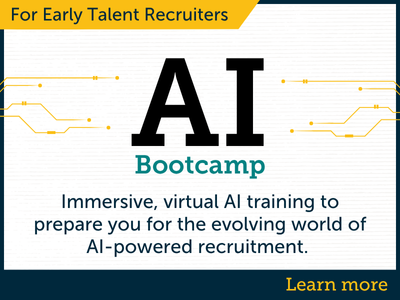Spotlight for Recruiting Professionals
There are several key steps that organizations can take to best support “onlies” and provide a healthy space for them to excel at work.
“An ‘only’ is an employee who represents the only person from their affinity group, such as the only black, only woman, only LGBTQA, and more,” explains Chelsea C. Williams, founder and CEO of College Code, a talent development and retention consultancy that helps organizations develop and retain diverse early career talent.
Williams cites research from McKinsey that shows approximately 64 percent of all women reported they have experienced microaggressions at work. However, that number jumped to nearly 90 percent when women frequently found themselves in “only” situations.
Challenges onlies face may include imposter syndrome, covering (not being authentic self, hiding parts of identity and experiences), biases, and feeling a part of the “out group.”
“These are the same experiences many marginalized groups feel, but they are heightened for onlies,” Williams notes.
Williams strongly stresses that experiences vary significantly from "only" to "only," and the perspectives she shares are from those who have engaged with College Code.
“I often hear onlies say that they are asked to be the voice and image of diversity and inclusion [in their organization],” she continues.
“Many are happy to be involved, but feel the immense pressure to always have the right answers, which they share can be exhausting.”
To illustrate one of the challenges an only can face in the workplace, Williams offers the example of a technical designer for a global retail company in the fashion industry who is the only Asian member of her team. The designer says that whenever the subject of Asia comes up, the entire team comes to her for perspective and to answer questions.
“They don't realize that Asia is a large continent,” the designer writes. “I am Chinese, but they assume [that I] understand Japanese and Korean culture. I feel like I experience heighted microaggressions from my team. It's a lot to balance as my work responsibilities are demanding. I have even sought therapy to talk over what I experience daily.”
The pressure and isolation that onlies can feel may be heightened in a virtual work environment because of the removal of physical proximity. Some feel the outsider experience more intensely during these times and experience microaggressive behaviors continuously, such as being left out of emails and meetings, Williams notes. On the other hand, she points out that other onlies share that this experience has finally provided them an opportunity to be judged for their work since the daily reality of being, for instance, a woman or person of color is less overt.
Williams offers several suggestions for creating a supportive work environment for onlies:
- Acknowledge onlies—Do not ignore the situation, but seek to understand onlies’ unique experience and commit to consistent checkpoints and conversation to ensure you are best supporting their needs.
- Find matches—Ensure onlies are paired with managers who are equipped to help onlies excel. When necessary, ensure managers have participated in bias awareness training. Also, consider pairing onlies with a mentor to support assimilation. If mentor pairing is a part of the experience for all new hires, consider giving onlies an additional mentor.
- Ensure equity—Make sure there is equity in pay and in career development for onlies, who often fall between the cracks in these areas.
- Do not overwhelm onlies—Be cautious not to overwhelm onlies in firmwide recruitment events and marketing collateral. Many times, onlies feel the burden of having to represent an entire race, culture, or affinity group and it gets exhausting. Always ask if the individual would like to participate, do not judge a decision or preference, and honor the individual’s decision to say no.
- Foster internal and external support systems—If it is difficult to connect with a mentor or sponsor, consider investing in professional development by allowing an only employee to attend an industry conference for their specific affinity. Showing that you care about who they are is one of the most impactful things you can do.
During the coronavirus pandemic, when many companies are working remotely and the pressure and isolation that onlies can feel may be heightened, Williams offers the following recommendations for supporting them:
- Check in—Make no assumptions on the experience. Setting up a check-in call/Zoom meeting can make a substantial difference. Get proximate by showing a genuine interest in providing support.
- Seek to understand any unique challenges—This is a great opportunity to understand intersectional experiences, family concerns, and any barriers that may be heightened in a virtual setting.
- Leverage your diversity and inclusion champions—Determine how they can best be leveraged during this time authentic to your organization. For example, they might they reach out to onlies and set up intro/check-in meetings.
There are important benefits for supporting onlies and diversity throughout your organization.
“Studies from McKinsey show that racially diverse teams, for example, yield a 35 percent greater return and gender diverse teams yield 30 percent greater returns,” Williams says.
“Remember that the onlies population is one to cultivate, support, and develop to create opportunity for your organization.”
Chelsea C. Williams is the founder and CEO of College Code.





